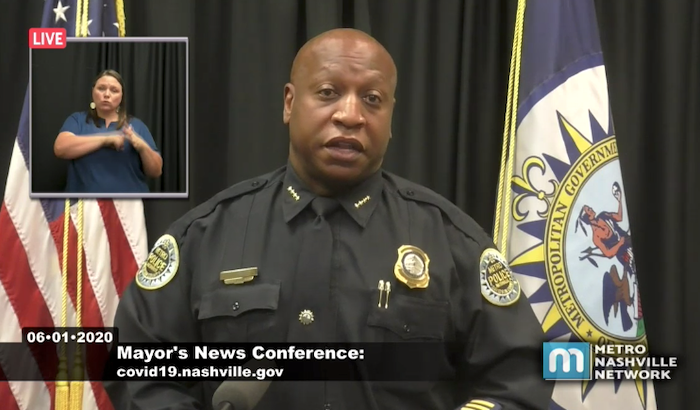
Interim Chief John Drake has been leading the Metro Nashville Police Department for less than a week, and he’s already got a long to-do list he says he’s ready to tackle. But transforming the department won’t be easy.
Drake emerged as a leading contender for the top job at MNPD even before his predecessor, Steve Anderson, abruptly stepped down last week. He’s a Black Nashville native who’s been with the department for more than three decades. And he’s got big ideas.
“Whenever you’re a deputy chief or anyone in this department that’s a leader, you always assume things that you would do differently,” he told reporters at a press conference Friday.
Drake says his first priority will be to work with the mayor to prevent the spread of the coronavirus — particularly through stricter mask enforcement. But he also hopes to recruit more female and minority officers, to better support people experiencing homelessness and to boost community engagement.
Drake says the department will disband its flex units, which drive around seeking out rule breakers to arrest. The proactive units have been criticized in the past for making lots of traffic stops and stop-and-frisks in parts of the city that some say are over-policed.
“(We) want give ice cream, want to meet people. We want to tell them who we are and continue to build trust,” he says. “We want community building.”
Drake has served with the department for more than three decades and has served in various leadership positions over the years. Most recently, the former chief picked him to lead the Community Services Bureau, which oversees the department’s eight neighborhood precincts.
Sekou Franklin with Community Oversight Now, the group that advocated for civilian oversight of the police department, says picking Drake would be a “safe hire.” But activists have said for years that merely handing out ice cream and having a few friendly encounters won’t solve decades-long distrust between police and community members.
“I think that if you want to move Nashville forward towards changing the culture of Nashville, I think it’s going to require an outside person,” he says. “It’s not due to any concrete issues with Drake. … There’s a deep-rooted good-old-boy culture at MNPD. And that good-old-boy culture — the senior ranking Black police officers, from our perspective, have not shown up.”
Allegations of discrimination, sexual misconduct and unfair enforcement
After a decade as chief and amid growing criticism from protesters against racial injustice, Anderson announced this summer that he would retire at the end of October. But then last Thursday, Mayor John Cooper announced that retirement date had been accelerated and Anderson would leave immediately.
The move came a day after 19 current and former female employees said they’d been sexually assaulted, harassed or subjected to discrimination because of their race or gender. Both Anderson and Cooper had received emails about several of the allegations dating back to April.
But the complaints didn’t come to light until a former sex abuse detective with the department spearheading her own investigation held a virtual press conference.
Then, just hours later, police arrested and jailed a Black man experiencing homelessness for not wearing a mask on Lower Broadway. It was the first arrest under a new policy announced after the department had been criticized for choosing not to cite or arrest thousands of unmasked honky tonk goers in days prior.
By the next morning, Cooper announced that Drake would be replacing Anderson — at least temporarily — by the end of the day, without explanation. His office has declined to comment further on the decision.
The city is supposed to spend the next few months conducting a nationwide search for a new police chief. They’ve hired a consultant, solicited community input and are rewriting the job description to better fit the community’s current needs. In a press release, the mayor’s office said it is looking for someone “who will make Nashville a model of community and engagement and policing innovation.”
But Franklin wonders if the mayor has already made up his mind, before the search has even truly begun. And he wonders just how committed Cooper really is to reform.
“If one wants to deal with the institutional racism and sexism and all that kind of stuff, it will not just be a new chief that does that, no matter how great the chief is,” Franklin says. “It’s going to have to require deeper commitments from all the moving parts of Nashville, including the mayor.”
Samantha Max is a Report for America corps member.

